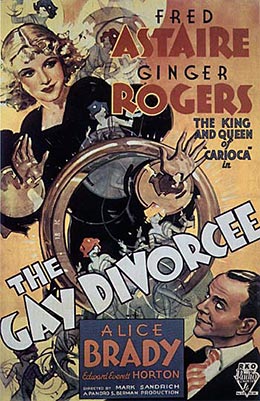
Once the partnership was formed, there was no going back:
‘[The Gay Divorcee] worked so well on the screen that Top Hat was immediately planned as a follow-up, which would shine with even more self-confidence but would otherwise stick as closely as possible to the original mixture of light sophistication, wisecracks and style against a nimble musical backing.’
The standout sequence from this film however, was its closing number:
‘The Gay Divorcee has The Continental, which may be the most overwhelming musical number ever filmed, and at seventeen minutes is certainly the longest. Its mindless beat and rhythmic cadences are so infectious that most people will be surprised to read among the credits below that it isn’t by Kern or Porter or Berlin but by two fellows called Con Conrad and Herb Magidson, who might charitably be called unknown. They got an Academy Award all the same.’
Fred Astaire and Ginger Rogers wrote their names across the thirties and would become a warm memory for all who saw them:
‘Is it only to those who grew up in the thirties that the tunes in the Astaire-Rogers musicals seem so achingly sweet?... the lyrics were unassuming, the melodies simplicity itself, yet no more was needed to set the world dancing.’
The beginning of an era, as a legendary dancing partnership taps their way into movie history:
‘All the Astaire-Rogers musical comedies of the thirties had pleasing segments… the very titles bring a rosy glow to the cheeks of habitués.’
Fred and Ginger had appeared together in Flying Down to Rio (1933) but this was the first proper musical vehicle designed specifically for them.
‘…all of the expected elements were firmly established in The Gay Divorcee: meeting cute, initial rapport, misunderstandings, double-entendres, and a repertory of friendly show-offs in comic support.’

Halliwell |
| The Gay Divorcee |